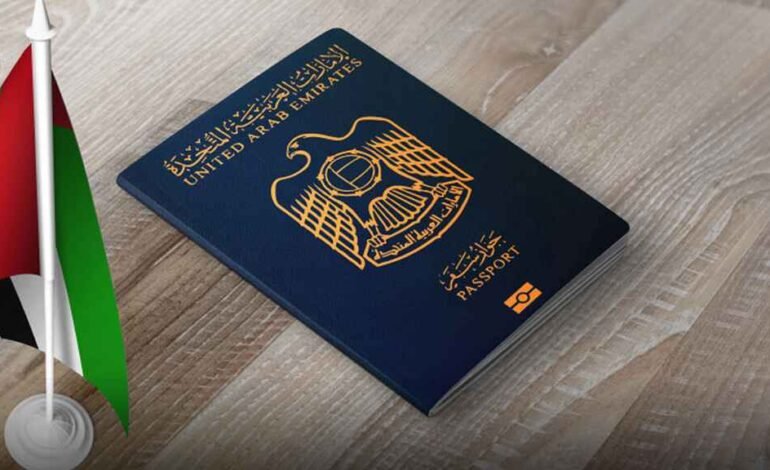The UAE stands as one of the world’s premier destinations for expatriate workers, with over 85% of its population consisting of foreign nationals. If you’re planning to pursue career opportunities in Dubai, Abu Dhabi, or any other emirate in 2025, securing a UAE Work Visa is your gateway to legal employment and residency.
This comprehensive guide covers everything you need to know about the UAE Work Visa process, from initial requirements and sponsorship rules to renewal procedures and common pitfalls to avoid. Whether you’re a first-time applicant or looking to renew your existing visa, this guide will help you navigate the system with confidence.
UAE Work Visa Requirements (2025 Update)

The UAE Work Visa application process involves both employer and employee responsibilities. Understanding these requirements upfront can save you time and prevent costly delays.
Essential Documents for Employees
Valid Passport: Your passport must have at least six months of remaining validity from the application date. Ensure all pages are clear and readable, as damaged passports often lead to rejections.
Educational Certificates: Professional roles typically require attested educational documents. Certificates must be attested by your home country’s Ministry of Foreign Affairs and then by the UAE embassy or consulate. This process can take several weeks, so start early.
Medical Fitness Certificate: Some countries require a pre-arrival medical examination. Check with the UAE embassy in your home country for specific requirements, as these vary by nationality.
Passport-size Photographs: Submit recent, clear photographs with a white background. The exact specifications may vary, but standard passport photo dimensions typically suffice.
No Objection Certificate (NOC): If you’re currently employed elsewhere, some employers may request an NOC from your current employer, though this isn’t always mandatory.
Employer Requirements
Valid Trade License: The sponsoring company must hold a valid UAE trade license and be registered with the relevant authorities.
Labor Quota: Employers must have available labor quota slots based on their business classification and previous compliance history.
Salary Requirements: The offered salary must meet minimum wage requirements for the specific job category and nationality, as outlined by the Ministry of Human Resources and Emiratisation (MoHRE).
UAE Work Visa Application Process
The UAE Work Visa application follows a structured five-step process that typically takes 2-4 weeks to complete. Understanding each stage helps manage expectations and ensures smooth processing.
Step 1 – Employer Applies for Entry Permit
Your UAE-based employer initiates the process by applying for an entry permit through the MoHRE system. This application includes your personal details, job description, salary information, and scanned copies of your documents.
The employer must demonstrate that the position requires your specific skills and that no suitable UAE national or GCC citizen is available for the role. This step usually takes 3-7 business days, depending on the completeness of submitted documents.
Step 2 – Entry Permit Issued
Once approved, you’ll receive an entry permit valid for 60 days from the issue date. This permit allows you to enter the UAE and begin the remaining visa processing steps. The permit cannot be extended, so plan your travel accordingly.
During this stage, ensure all your documents are ready for the next steps, including medical examination appointments and Emirates ID registration.
Step 3 – Medical Exam & Emirates ID Registration
Upon arrival in the UAE, you must complete a medical examination at an approved health center within 30 days. The medical test includes blood work, chest X-rays, and screening for communicable diseases.
Simultaneously, you’ll need to register for your Emirates ID at an official typing center or through the ICP (Identity and Citizenship Program) app. This biometric identification card is mandatory for all UAE residents.
Step 4 – Labor Contract Approval
Your employer submits the labor contract to MoHRE for final approval. This contract outlines your job responsibilities, salary, benefits, and employment terms. Both parties must sign the contract, and any future amendments require official approval.
The labor contract serves as the foundation for your work visa and establishes your legal employment status in the UAE.
Step 5 – Work Visa Stamping on Passport
The final step involves stamping your work visa directly into your passport. This process typically takes 2-3 business days and officially grants you legal residency status in the UAE.
Your work visa will include details such as validity dates, sponsor information, and any specific conditions or restrictions related to your employment.
Costs & Processing Times
Understanding the financial and time commitments involved in obtaining a UAE Work Visa helps you plan effectively and avoid unexpected expenses.
Cost Breakdown
The total cost for a UAE Work Visa typically ranges from AED 3,000 to AED 6,000 ($815 to $1,635), though this varies based on several factors:
| Component | Estimated Fee (AED) |
|---|---|
| Entry Permit / Work Permit | 250 – 3,450 (company classification dependent) (UAE Government Portal) |
| Medical Fitness Exam | 300 – 500 |
| Emirates ID (2 years) | ~370 |
| Residency Visa + Stamping | 510 – 560 (3-year visa) |
Typing and Documentation: AED 200-300
Status Change (if applicable): AED 500-1,000
Typical Total Cost:
- Mainland Company: AED 5,000–7,000
- Free Zone Company: AED 2,500–4,000
Most reputable employers cover these costs as part of the employment package. However, some smaller companies may ask employees to bear certain expenses, particularly for medical examinations or document attestation.
Processing Timeline
Total Processing Time: 2-4 weeks from application to visa stamping
Entry Permit: 3-7 business days
Medical and Emirates ID: 1-2 weeks
Labor Contract Approval: 3-5 business days
Visa Stamping: 2-3 business days
Processing times can extend during peak seasons (September-November and January-March) or if documents require additional verification.
UAE Work Visa Duration & Renewal
UAE Work Visas are typically issued for 2-3 years, aligned with your employment contract duration. Understanding renewal procedures ensures continuous legal status and employment authorization.
Visa Validity Periods
Standard Duration: 2-3 years based on contract length
Minimum Validity: 1 year for most professional roles
Maximum Validity: 3 years, with some exceptions for senior management positions
Your visa validity directly correlates with your employment contract. If you sign a 2-year contract, your work visa will typically match this duration.
Renewal Process
Work visa renewal must be initiated at least 30 days before expiration. Your employer handles the renewal process, which involves:
Document Updates: Refreshing medical examinations, passport validity checks, and updated salary certificates
Contract Review: Confirming continued employment terms and any modifications
Fee Payment: Renewal fees typically range from AED 1,000 to AED 2,000
Processing Time: 1-2 weeks for standard renewals
Grace Period Considerations
The UAE provides a 30-day grace period after visa expiration for renewal or departure. However, you cannot work during this period, and overstaying beyond the grace period incurs daily fines.
Overstay Fines & Penalties
Visa violations carry serious consequences in the UAE. Understanding the penalty structure helps you avoid costly mistakes and potential employment bans.
Daily Fine Structure
First 30 days: AED 25 per day
31-90 days: AED 50 per day
Beyond 90 days: AED 100 per day
These fines accumulate daily and must be paid before departure or visa renewal. For extended overstays, fines can reach substantial amounts, sometimes exceeding AED 10,000.
Additional Consequences
Employment Ban: Repeated violations may result in employment bans ranging from 6 months to 2 years
Deportation: Severe violations can lead to immediate deportation and entry bans
Sponsor Penalties: Employers may face fines and quota reductions for employee violations
Avoiding Penalties
Monitor your visa expiry dates closely and communicate with your employer well in advance of renewal deadlines. Set calendar reminders 60 days before expiration to ensure timely renewal processing.
Common Work Visa Rejection Reasons
Understanding why work visa applications get rejected helps you prepare stronger applications and avoid common pitfalls.
Documentation Issues
Incomplete Attestation: Educational certificates must be properly attested by both home country authorities and UAE diplomatic missions. Missing attestations are the leading cause of rejections.
Document Authenticity: The UAE employs sophisticated verification systems. Any discrepancies in document authenticity result in immediate rejection and potential legal consequences.
Expired Documents: Ensure all supporting documents, particularly passports and certificates, meet validity requirements throughout the application process.
Medical Fitness Concerns
Communicable Diseases: Positive tests for tuberculosis, HIV, or hepatitis B typically result in rejection
Pregnancy: Pregnancy discovered during medical examination may delay processing
Age-related Health Issues: Older applicants may face additional medical scrutiny
Previous Immigration Violations
Outstanding Fines: Unpaid overstay fines from previous visits must be settled before new applications
Employment Bans: Previous violations may result in temporary employment bans
Absconding Cases: Unresolved absconding reports prevent new visa issuance
Employer Compliance Issues
Labor Quota Violations: Employers exceeding their approved worker quotas cannot sponsor new employees
Outstanding Government Dues: Employers with unpaid government fees face processing delays
License Issues: Inactive or suspended trade licenses prevent visa sponsorship
FAQs – UAE Work Visa 2025
Can I change employers on a work visa?
Yes, but the process requires specific steps. Your new employer must apply for a transfer of sponsorship, and you need a No Objection Certificate (NOC) from your current employer. Without an NOC, you must wait six months after resignation before joining a new company, unless you’re in a professional category exempt from this rule.
Can I bring my family after getting a work visa?
Family sponsorship depends on your salary level and job category. Generally, you need a minimum monthly salary of AED 4,000-10,000 (varying by emirate) to sponsor immediate family members. You must also provide accommodation meeting specified standards and purchase health insurance for dependents.
How long does it take to get a UAE work visa?
The standard processing time is 2-4 weeks from application submission to visa stamping. However, this can extend to 6-8 weeks if documents require additional attestation or verification. Plan accordingly, especially if you need to provide notice to current employers.
Who pays for the work visa fees?
Legally, employers are responsible for work visa costs as part of the employment package. However, some companies may negotiate shared costs or ask employees to cover specific expenses like medical examinations. Clarify this arrangement before accepting job offers.
Can I work for multiple employers with one work visa?
No, UAE work visas are employer-specific. Each visa ties you to one sponsoring company. If you want to work part-time or freelance for additional companies, you need separate permits or must obtain a freelance permit through designated free zones.
What happens if my employer cancels my work visa?
Visa cancellation provides a 30-day grace period to either find new employment (with proper sponsorship transfer) or leave the country. You cannot work during this period, and staying beyond 30 days without new valid residency incurs daily overstay fines.
Conclusion
Obtaining a UAE Work Visa in 2025 requires careful planning, proper documentation, and compliance with current regulations. The process, while structured, demands attention to detail and adherence to specific timelines.
Start your application process early, ensure all documents are properly attested, and maintain clear communication with your sponsoring employer throughout the process. Remember that work visa regulations can change, so always verify current requirements through official channels or qualified immigration consultants.
For related information on UAE residency options, explore guides on the Golden Visa program for long-term residency, tourist visa requirements for short-term visits, or family visa procedures for dependent sponsorship.
Success in securing your UAE Work Visa opens doors to one of the world’s most dynamic employment markets, offering career growth opportunities in a truly international environment.







